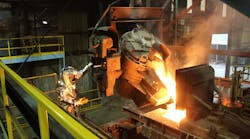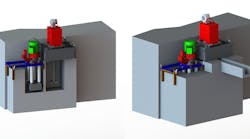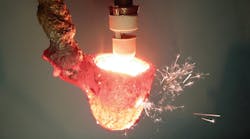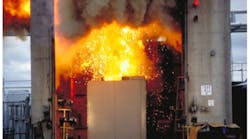The federal Occupational Safety and Health Administration (OSHA) cited Pure Power Technologies LLC with eight safety violations following an incident last June 25 at that group’s ductile iron/CGI foundry in Waukesha, WI. A maintenance supervisor endured severe burns from an electric arc flash while servicing a 480-volt circuit breaker without proper electrical protective equipment.
Pure Power Technologies is a subsidiary of Navistar International that produces diesel engine fuel systems, emission controls, and after-treatment technology, and includes two ferrous foundries — at Waukesha and Indianapolis.
OSHA proposed penalties of $119,000 for the violations, and the company was allowed 15 business days from the date of the citations to comply, request an informal conference with OSHA's area director, or contest the findings before the independent Occupational Safety and Health Review Commission.
An arc flash results from an electrical fault that generates an arc, ionizing the air and causing combustion. Reportedly, arc flash is the most frequent electrical accident in workplaces, and may cause burns or other injuries due to the explosion (e.g., shrapnel, pressure waves, electric shock.
The usual causes of arc flash may be mechanical (accidental touching, dropping metal tools or parts, faulted lines, loose connections), environmental (water, dust, impurities, or corrosion at contact surfaces), or failure of insulating materials.
Pure Power Technologies was cited with one willful violation for failing to ensure protective equipment was used while operating the circuit breaker with the cover removed, thus exposing workers to electrical shock, arc blast, and flash hazards.
OSHA categorizes as “willful violations” those committed with intentional knowledge or voluntary disregard for the Occupational Safety and Health Act of 1970, or with plain indifference to worker safety and health. Under the law, employers are responsible for providing safe and healthful workplaces for their employees.
In addition, OSHA cited Pure Power with seven serious violations, including: failing to implement safety-related work practices and use shield, barriers, and insulating materials to protect workers; re-energizing circuits before determining that conditions were safe; failing to conduct air tests on insulating rubber gloves prior to use, and to electrically test gloves every six months; failing to conduct periodic machine inspections; failing to provide training in safety-related electrical work practices specific to job assignments; re-energizing circuits before determining that the equipment and circuit could be safely energized.
A “serious violation” is issued when OSHA finds there is substantial probability that death or serious physical harm may result from a hazard about which the employer knew, or should have known.
"It's unacceptable that Pure Power Technologies failed to ensure employees were following safe work practices," stated OSHA’s Milwaukee area director Chris Zortman. "Employers have a responsibility to take all precautions to protect workers from known hazards that exist in their facilities."









